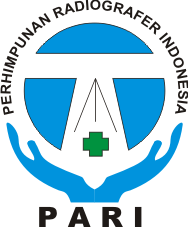The Examination Technique of Genu in Case of Ligament Cruciatum Anterior (ACL) Rupture by Open MRI In Jogja International Hospital
Abstract
The technique of MRI Genu examination technique in case of Ligament Cruciatum Anterior (ACL) Ruptur by open MRI was conducted in 3 (three) steps, i.e. full extension SE T1 Coronal Genu, 30 degree SE T1 sagital Genu Flexi, and 90 degree SE T1 sagital genu flexi. The research aimed to find out the examination technique of MRI Genu in Ligament Cruciatum Anterior (ACL) rupture by open MRI in Jogja International Hospital, in which comprised of preparation, examination technique, informative level of sequence parameter selection and reason of using sequences and optimization of MRI Genu examination in case of Ligament Cruciatum Anterior (ACL) rupture by open MRI. T he research was conducted by observation method to the implementation of examination and in depth interview with five respondents wherein the data was used as primary data; meanwhile documentation and literature were used as secondary data. The data analysis was conducted by using descriptive analysis. The result of research showed that examination technique of MRI Genu in the case of Ligament Cruciatum Anterior (ACL) rupture by open MRI was conducted in three steps, i.e. full extension SE T1 coronal genu, 30 degree SE T1 sagital genu flexi, and 90 degree SE T1 sagital genu flexi. Each of them was conducted scannogram initially by reason patient’s position had been altered. From these three sequences, according to the clinicians, SE T1 sagital sequence of 30 degree Genu flexi ACL is the clearest position to see the ACL; however according to the executors sequence of 90 degree SE T1 sagital genu flexi is the easiest to reconstruct on the ground the position of patient’s leg is more fix and it is seldom to happen alteration than the position of full extension SE T1 coronal genu and 30 degree SE T1 sagital genu flexi. The examination of MRI genu in Jogja International Hospital uses open MRI and multi-purpose coil/flexible coil thus it is possible to make variation of flexi genu, and merely taken SE T1 sequence. Some respondents have a notion that using eximation technique by sequence selection has been informative, however it still needs to add axial, sagital and coronal slice of which comprises of T1, T2 and PD in order the diagnostic information gained is more accurate by reason the excellent diagnostic enforcement will be the path of a physician in providing treatment by shape medication therapy and appropriate handling to the patient.
Full Text:
PDFDOI: https://doi.org/10.31983/link.v9i3.299
Article Metrics
Abstract view : 349
Download PDF : 156
Refbacks
- There are currently no refbacks.
LINK (ISSN: 1829-5754 e-ISSN: 2461-1077), dipublikasikan oleh Pusat Penelitian dan Pengabdian kepada Masyarakat, Poltekkes Kemenkes Semarang, Jl. Tirto Agung, Pedalangan, Banyumanik, Semarang, Jawa Tengah 50268, Indonesia; Telp./Fax: (024)7460274
Public Services :
![]() E-mail: link@poltekkes-smg.ac.id
E-mail: link@poltekkes-smg.ac.id
 LINK is licensed under a Creative Commons Attribution-ShareAlike 4.0 International License
LINK is licensed under a Creative Commons Attribution-ShareAlike 4.0 International License















